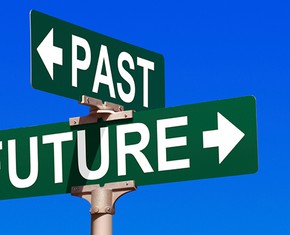The views expressed in our content reflect individual perspectives and do not represent the authoritative views of the Baha'i Faith.
We would all like to be fully mature beings, but humans develop slowly—after we’re born, it takes at least a decade and a half for us to reach physical maturity.
With that slow process in mind, how long does it take for us to achieve our moral and spiritual maturation? Most mammals attain their physical maturity in just a few years after birth, but people take much longer—our physical maturation process requires a decade or two, depending on our culture, climate and upbringing. Our morality and our spirituality, however, often takes much longer:
Man must walk in many paths and be subjected to various processes in his evolution upward. Physically he is not born in full stature but passes through consecutive stages of fetus, infant, childhood, youth, maturity and old age. …
Briefly; the journey of the soul is necessary. The pathway of life is the road which leads to divine knowledge and attainment. Without training and guidance the soul could never progress beyond the conditions of its lower nature … – Abdu’l-Baha, The Promulgation of Universal Peace, p. 296.
With this spiritual perspective on the evolution of the physical, we can start to see our own increasing complexity, our long-term inner maturational process, as the most important part of the pathway of life—and as a timeless, eternal, ever-unfolding reality. Morally and spiritually, we reach and pass through identifiable developmental stages, as Abdu’l-Baha describes:
… regarding the progress of the spirit in the world of the Kingdom after its ascension, it is wholly beyond space and time, and developments, after leaving this body, are spiritual and not terrestrial. It is like unto the progress of the child from the world of the fetus to the world of maturity and intelligence, from the world of ignorance to the world of knowledge, from the station of imperfection to the pinnacle of perfection.
As Divine Perfections are infinite, therefore the progress of the spirit is limitless. – Abdu’l-Baha, Star of the West, Volume 2, p. 15.
This Baha’i concept—that the human spirit and our individual morality evolves and grows through a series of stages, just like the human body does—has taken hold in contemporary psychology.
Many of our foremost thinkers, researchers and therapists have uncovered strikingly similar, stage-specific models that map and describe the path of inner moral and spiritual development. Alfred North Whitehead, Abraham Maslow, Rollo May, Carol Gilligan, Robert Kegan, Lawrence Kohlberg, Carl Jung, Erik Erikson, Jean Piaget, and Ken Wilber have all proposed ideas, concepts and theories that dovetail remarkably well with the overall idea of a sequence of developmental levels in moral, psychological and spiritual growth. These sequential developmental theories and models work universally, unfolding the mysteries of human moral and spiritual growth in all of us.
People who experience growth on this moral developmental ladder describe it as an opening of the heart and a widening of the scope of consciousness, gradually moving the seeker from love for self to love for others and then toward love for all. As the psychologist Lawrence Kohlberg pointed out in his six-stage moral development model, that expanding consciousness can culminate in one of two levels—which he called “conventional” and “post-conventional.” Today, the post-conventional level is often called “universal morality.”
In the conventional stage, moral authority is internalized—but not questioned. Usually, adults who adopt conventional morality base their moral decisions on the norms of the wider group or society they belong to. Those with conventional morality tend to practice the conventions of their culture, and rarely rise above it.
In the post-conventional/universal stage, however, individual judgment comes instead from reason, independent investigation and self-chosen, self-examined principles. Post-conventional adults usually base their morality, not on their society or cultural conditioning, but on individual rights and justice—on universal moral principles and values. In his research, Kohlberg found that only 10-15% of adults are capable of the kind of abstract, independent thinking necessary for post-conventional morality.
Most people, then, adopt their moral standards from those around them—they do what others do, without ever really questioning the underlying basis of that morality. But some do what the Baha’i teachings recommend, by thinking through their moral, ethical and spiritual principles for themselves:
Discover for yourselves the reality of things, and strive to assimilate the methods by which noble-mindedness and glory are attained among the nations and people of the world.
No man should follow blindly his ancestors and forefathers. Nay, each must see with his own eyes, hear with his own ears and investigate independently in order that he may find the truth. The religion of forefathers and ancestors is based upon blind imitation. Man should investigate reality. – Abdu’l-Baha, Divine Philosophy, p. 24.
The Baha’i teachings say that if you’re interested in transcending conventional morality, and would like to advance your own moral and spiritual maturity, you must deeply investigate reality, and make your own decisions about it. To do that, you’ll need to jettison your inherited beliefs, truly examine and question the underlying principles you base your moral decisions on, and then discover new principles that conform to the results of your investigation.
If you’re thinking that this sounds like the scientific method, you’re right:
scientific method: n. principles and procedures for the systematic pursuit of knowledge involving the recognition and formulation of a problem, the collection of data through observation and experiment, and the formulation and testing of hypotheses. – Webster’s Dictionary
In the next essay in this series, we’ll explore how to apply that scientific method to a fearless spiritual and moral search for meaning.
















Comments
Sign in or create an account
Continue with Googleor